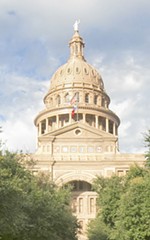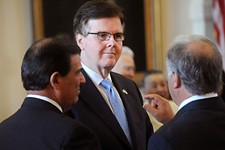Speaker No Evil: GOP Caucuses Up
Get ready for a rumble down at the Capitol
By Richard Whittaker, Fri., Jan. 7, 2011


The 82nd session of the Texas Legislature will convene for its first day of business at noon on Jan. 11. Yet before legislators can contend with minor matters like a projected budget deficit of more than $20 billion and the once-a-decade agony of redistricting legislative and congressional seats, there's an overwhelming priority: picking a speaker of the House.

With 101 GOP House members, there's little doubt that the speaker will be selected by and from the Republican House Caucus. So far, three Republicans – incumbent Speaker Joe Straus; establishment conservative Rep. Warren Chisum, R-Pampa; and tea party favorite Rep. Ken Paxton, R-McKinney – have filed paperwork. However, while the formal vote of the full House is scheduled for the first day of the session, the House Republican Caucus has scheduled a meeting at 11am on Jan. 10 to discuss picking a consensus candidate. Initially proposed by anti-Straus forces, the idea of a meeting has picked up momentum among all factions as a way to restore some semblance of party unity.
However, on Dec. 30, Rep. Dan Branch, R-Dallas, sent a letter to Republican House Caucus Chair Larry Taylor, R-Friendswood, warning that this plan could drag the GOP into a legal house of mirrors. Branch had already raised concerns about a caucus meeting when the issue was first raised and then abandoned in November. In this new letter, he warns Taylor that even a nonbinding resolution could violate not only the Texas Constitution and the party's own bylaws, but leave members open to criminal prosecution if the vote has any impact on the redistricting process.
With a few exceptions, Democrats have mostly left this debate to Republican infighting. Rep. Joe Deshotel, D-Port Arthur, warned that a nonbinding vote would not be "no harm, no foul" but would rather ensure that the House and the Texans it represents "will be harmed by the process and procedure leading to the vote itself, and not simply the outcome." Even former Democratic Speaker Rayford Price has weighed in, citing his own elevation to the speaker's chair in 1972. Democrats held the House with 139 seats, yet Price finally won with 77 votes – 68 Democrats and nine Republicans. While he had no objection to a caucus meeting, he wrote, "[A] majority of a political caucus has no right or authority to direct how any member will cast his vote."
Got something to say on the subject? Send a letter to the editor.










